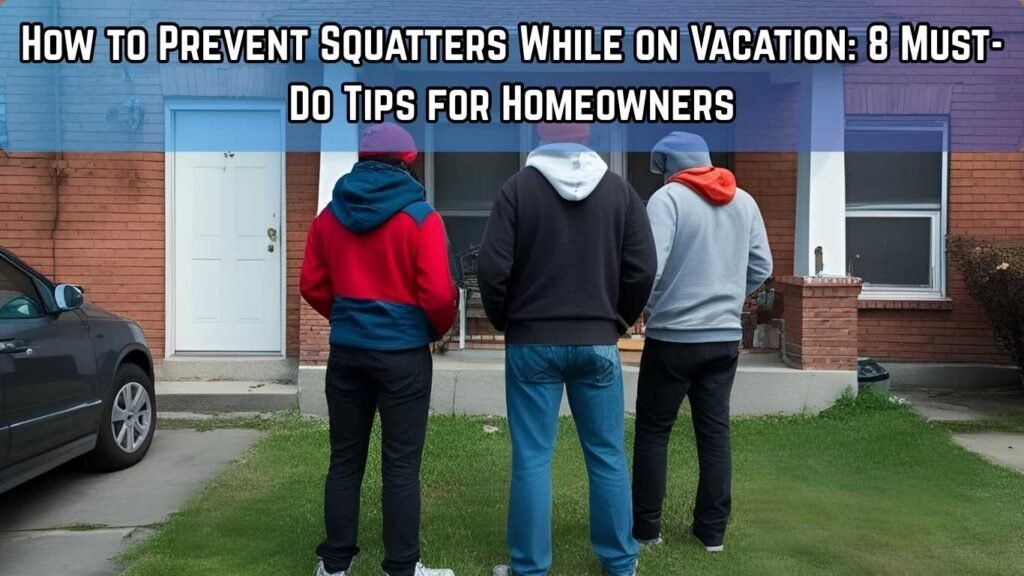Vacations are a time to relax and escape the daily grind, but when you’re away, your home is vulnerable to security risks. One such risk is the potential for squatters—individuals who occupy a property without permission.
Squatting can be a serious issue for homeowners, leading to financial, legal, and emotional headaches. The good news is that with a few proactive measures, you can prevent squatters from taking over your property while you’re away.
In this article, we’ll walk you through essential tips on how to prevent squatters while on vacation and keep your home safe. These strategies will not only protect your property but also save you time, money, and stress. Let’s dive in.
Understand What Squatting Is and Why It’s a Risk
Squatters are individuals who occupy a property without the owner’s consent. They may break into an empty home, take up residence, and stay there without paying rent. Squatters are often hard to remove, as laws in some regions can grant them legal rights to the property if they remain long enough.
Moreover, squatters can sometimes gain legal rights over your property through a process called “adverse possession,” which allows them to claim ownership if they occupy the property for a specified period of time. This is especially true if they make improvements or maintain the property during their stay.
In addition to that, removing squatters can be an expensive and lengthy process, involving legal fees, court hearings, and even repairs to damage done to the property. The emotional toll can also be significant, as homeowners deal with the stress of dealing with an unwanted situation and potential damage to their property.
How to Prevent Squatters While on Vacation: 8 Useful Tips
Now, let’s see some handy ways to stop squatters from occupying your property when you are on vacation…
1. Properly Secure All Entry Points
One of the most effective ways to prevent squatters from entering your property is to ensure that all entry points are securely locked and reinforced.
- Lock Doors and Windows: Double-check that all doors and windows are locked before you leave. Don’t forget secondary entrances like basements, attics, or side doors.
- Install Deadbolts and Reinforced Doors: Deadbolts are more difficult to break than standard locks. Reinforce doors and frames to prevent forced entry.
- Secure Sliding Glass Doors: Install safety bars or dowels to prevent sliding glass doors from being easily opened.
- Check Windows for Vulnerabilities: Ensure that all windows, particularly those on the ground floor, are locked securely. Consider adding security bars or locks.
- Secure the Property: Repair any broken fences, gates, or other vulnerabilities around the perimeter of your property to prevent unauthorized entry.
2. Use Smart Home Technology
Technology can provide an extra layer of security, making it harder for squatters to target your home.
- Smart Door Locks: Install keyless entry systems that allow you to lock and unlock doors remotely, ensuring no unauthorized access.
- Security Cameras: Set up cameras around the property, especially near entry points. Modern cameras often feature motion detection and send alerts to your phone if unusual movement is detected.
- Motion-Activated Lights: Place outdoor lights with motion sensors around the property to deter intruders and make your home appear inhabited, especially at night.
- Security Alarms: Invest in a home security system that includes remote monitoring, alerts, and even sirens to scare off potential squatters.
3. Maintain a Lived-In Appearance
A property that looks occupied is much less likely to be targeted by squatters. Use these tricks to make your home appear lived-in while you’re away.
- Timed Lights: Use timers to automatically turn lights on and off in different rooms, simulating normal activity.
- Mail Management: Pause mail delivery or ask a trusted friend or neighbor to collect your mail. Piles of mail can signal that no one is home.
- Yard Maintenance: Arrange for a neighbor or landscaper to mow the lawn, trim bushes, and care for your garden. An untidy yard can make your property look abandoned.
- Package Delivery Management: Have packages delivered to an alternative location, or ask someone to collect them for you. Piles of uncollected packages are a telltale sign that your house is vacant.
- Make the Property Appear Inhabited: Combine all of these tactics—timed lights, yard care, and mail management—to create a consistent “lived-in” appearance.
4. Rent Out Your Home or Have a Trusted House Sitter
Consider renting out your home or hiring a house sitter to ensure someone is present while you’re away.
- Consider Short-Term Rentals: Platforms like Airbnb or VRBO allow homeowners to rent out their properties on a short-term basis. This keeps the property occupied and under constant watch.
- Use a Vacation Rental Contract: If you choose to rent out your home, ensure you have a legally binding contract that outlines the renter’s responsibilities, and protects you from squatters.
- Hire a House Sitter: Hiring a trusted individual to stay in your home can provide peace of mind. They’ll take care of the property and alert you to any suspicious activity.
- Trusted Neighbors: If renting out or hiring a sitter isn’t an option, ask a trusted neighbor to keep an eye on things while you’re away.
- Don’t Allow 30+ Stay Days: Limit the length of rental stays to prevent squatters from taking advantage of longer terms and settling in for an extended period.
5. Inform Local Authorities and Neighbors
Notify local law enforcement and neighbors about your vacation plans to help protect your home while you’re away.
- Notify the Police: Let the local police know that you’ll be gone, so they can patrol your neighborhood more frequently and be alert to any suspicious activity around your property.
- Inform Trusted Neighbors: Share your travel dates with neighbors and ask them to report anything unusual, like unfamiliar people or vehicles near your home.
- Get to Know Your Neighbors: Building strong relationships with your neighbors makes them more likely to notice and report anything suspicious while you’re away.
- Community Watch Programs: Many neighborhoods have community watch programs. Join or utilize these programs to help monitor your property while you’re gone.
6. Consider Legal Protections Against Squatters
Taking legal steps to protect your property can provide an additional layer of security.
- Understand Squatter Laws: Familiarize yourself with local squatter laws and adverse possession rules. Knowing how squatters can gain rights to your property can help you take preventive action.
- Post “No Trespassing” Signs: Clearly mark your property with “No Trespassing” signs to legally discourage squatters from entering.
- Pre-Sign Documents: Work with a lawyer to prepare eviction notices or legal documents in advance, so you can act quickly if squatters attempt to move in.
- Get Squatters Insurance Coverage: Look into specialized insurance policies that cover squatter-related issues, including legal fees for eviction processes.
7. Maintain a Record of Property Ownership
Maintaining proper documentation can help protect your property in case of a squatter-related dispute.
- Keep Property Documentation Updated: Ensure your title deeds, insurance papers, and other official documents are current and easily accessible.
- Photographic Evidence: Take regular photos of your home and possessions to establish the property’s condition. This will provide evidence if squatters cause damage during their illegal occupation.
8. Conduct Regular Property Inspections
Regular property inspections can help identify any signs of unauthorized entry or squatters.
- Inspect Your Property: If possible, check on your property periodically to ensure no one has entered. This can be done by yourself, or through a property management service.
- Hire Property Management: For extended vacations, consider hiring a property management company that can conduct regular inspections and ensure everything is secure.
What to Do if You Suspect Squatters Are On Your Property?
If you suspect squatters have moved in, acting quickly is key.
- Immediate Action: Contact local law enforcement if you believe squatters have entered your property. The authorities can help you deal with the situation safely and legally.
- Documentation: Document the situation thoroughly, including photographs and any communications with squatters, to avoid legal complications.
- Consult Legal Experts: Consult with a real estate lawyer to understand the best course of action for eviction and to protect your property rights.
FAQ
Q1: How do I know if someone is squatting in my home?
Look for signs such as broken locks, unexpected trash, or unfamiliar vehicles in your driveway. Squatters may also leave behind personal belongings.
Q2: What are my rights if squatters are living in my house?
Your rights depend on local laws, but typically, squatters can be removed legally through eviction processes. Consult a lawyer to understand your specific situation.
Q3: Can squatters legally claim ownership of my property?
In some cases, squatters can claim ownership through adverse possession if they occupy your property for a long enough period without your consent. However, there are often legal defenses you can use to prevent this.
Q4: How can I make my property less appealing to squatters?
Ensure your property looks well-maintained and occupied. Secure all entry points, install security cameras, and make sure there are no obvious signs that the home is vacant.
Conclusion
Vacations should be a time to relax, not worry about your property. By taking the right precautions and being proactive, you can ensure that your home remains safe from squatters while you’re away. Use the tips outlined in this article to secure your property, create the appearance of occupancy, and take legal steps to protect your home.
Remember: preventing squatters is all about preparation. Plan ahead, and you can enjoy your vacation with peace of mind knowing your home is safe.




